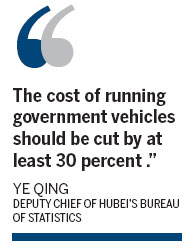Drivers lose jobs amid austerity campaign
By An Baijie in Beijing and Feng Zhiwei in Changsha (China Daily) Updated: 2014-03-10 09:35Chen Qi (not his real name) has been unemployed for some months after the local authority cut spending last year in line with a national austerity drive.
Chen was the driver for a county-level deputy official at Hunan Provincial Development and Reform Commission for four years from 2009 to 2013, but lost his job at the end of last year.
In November, the Communist Party of China Central Committee and the State Council jointly issued a regulation to reduce local authority expenditure. This required public agencies to cut their vehicle fleets, receptions and overseas trips. These were often referred to as the "three public consumptions".
|
 |
The use of all vehicles, except those required for law enforcement, emergency duties and essential public services, was scrapped or severely reduced.
"Many of my colleagues became unemployed overnight," Chen said, adding that many of the drivers had to seek other jobs such as driving taxis.
According to the budget approved by Hunan Provincial People's Congress, the provincial government's public expenditure will be 860 million yuan ($141 million) this year, which is 13 million yuan less than the previous year.
Other provincial-level regions also publicized their measures to cut spending on official vehicles during their people's congress sessions in January and February. For example, the government of the Inner Mongolia autonomous region said it has cut expenditure on the "three public consumptions" by 34 percent from last year.
Even for those drivers who have not been dismissed, their income has fallen as their "gray income" has dropped sharply.
Gray income refers to over-claiming on vehicle maintenance, receiving bribes and gifts from others trying to curry favor, to put in a good word for them with the official they were driving. But with tougher anti-corruption measures, this has fallen dramatically, Chen said.
Chen refused to disclose the exact amount of his "gray income", only saying that it was always much more than his salary - about 1,500 yuan per month.
In a case tried last year, Xu Minghui, a driver at Yueyang City Bureau of Land and Resources in Hunan province, was sentenced to 14 years for fraudulently claiming 1.55 million yuan in public funds on false vehicle maintenance invoices.
The amount of "gray income" varied for drivers depending on the rank of those they drove.
According to the Communist Party of China Central Commission for Discipline Inspection, the country's top anti-graft agency, 30,240 officials were punished last year for violating frugality directives and maintaining lavish lifestyles.
The income drop has led to the resignation of many drivers - at least five drivers in a government department in Changsha have resigned, and many other drivers in the city's public agencies have also resigned since last year, Legal Weekly reported.
Ye Qing, deputy chief of Hubei Provincial Bureau of Statistics, who has for years sought reform of the use of official cars, said that more drivers are likely to become unemployed.
Ye said that he read an investigation report in 2010 which said that there were about 2.3 million government vehicles nationwide, costing 150 billion to 200 billion yuan annually. The authorities have never officially released the number of China's government vehicles.
"The cost of running government vehicles should be cut by at least 30 percent," he said, adding that stricter measures are expected after the session of the National People's Congress that opened on March 5.
Wen Xinzheng in Changsha contributed to this story.
- More female officials caught in corruption
- Whampoa veterans recorded with glory
- Police bust 9 terrorist groups in Xinjiang
- Knife-wielding attackers seized in Xinjiang
- New regulation leads to drop in petitioned cases
- Hunan plant shut as probe into lead poisoning begins
- Police boost efforts to combat gambling
- Project offers jobs openings to legal experts
- Experts: Dog meat festival 'illegal'
- Nation looks to upgrade
pipeline networks






